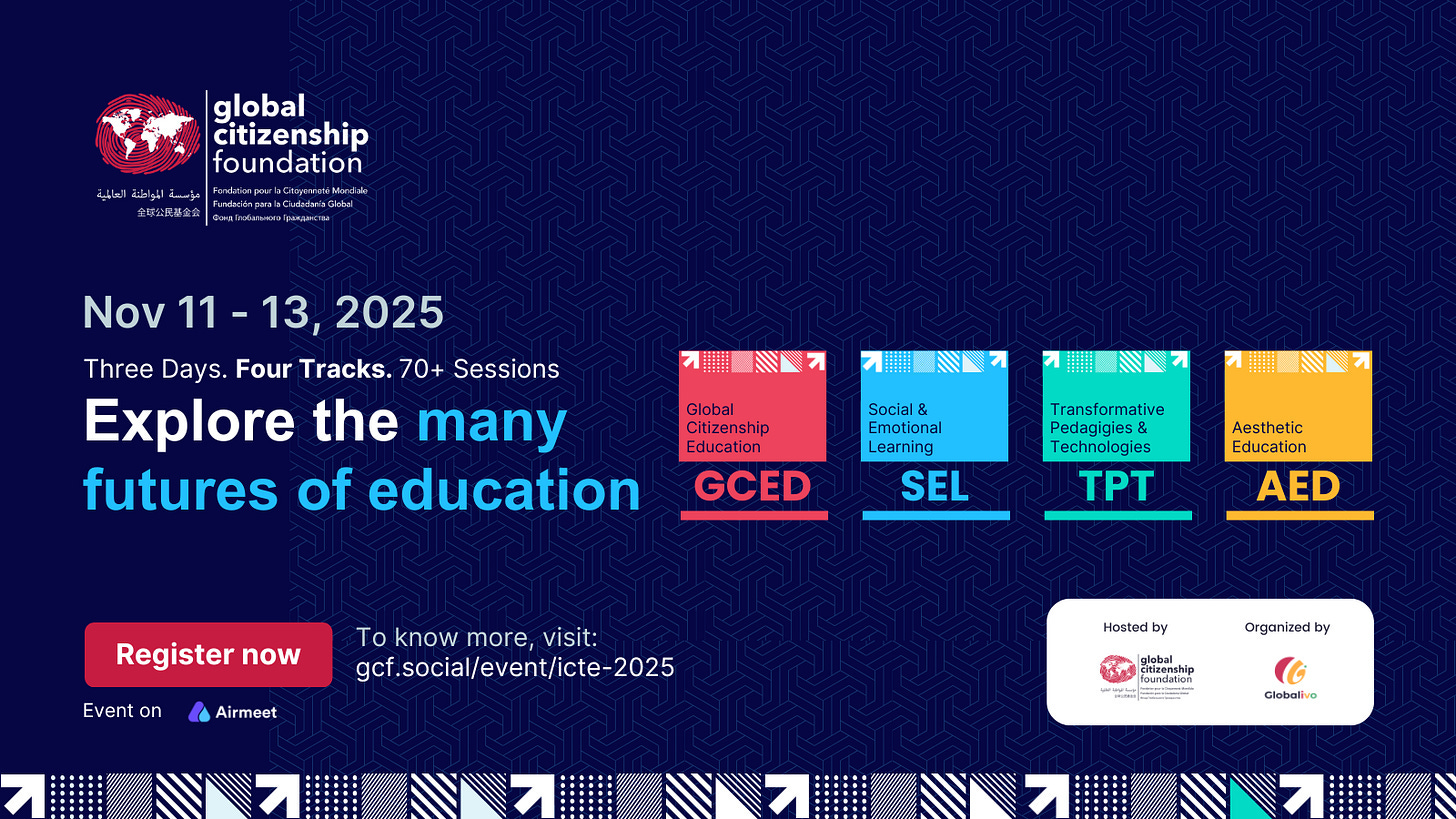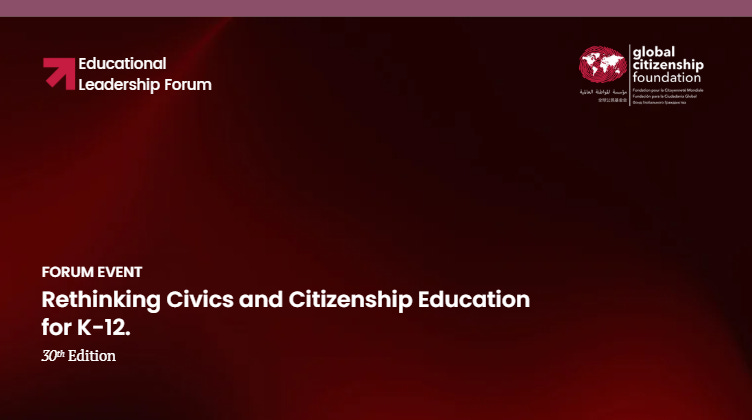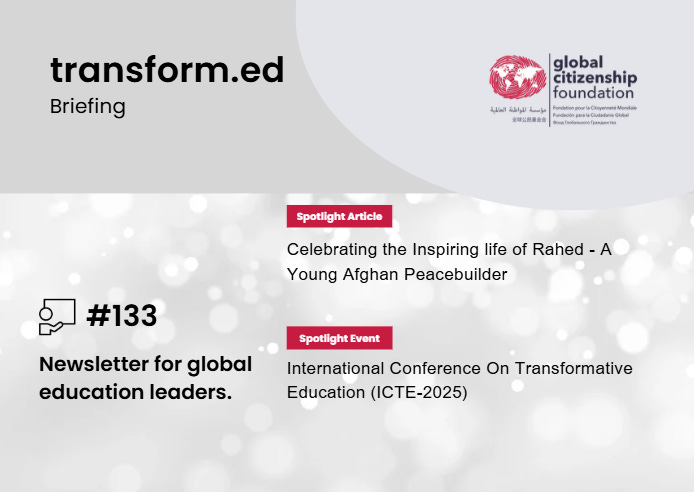Humanitarian Education as Everyday Practice | Transform.Ed Briefing #133
Inside the Briefing: Discussing the significance of providing education in emergency settings, and exploring strategies for embedding human values and equity across all education systems.
Quick Updates 🔔
🌍✨ International Conference On Transformative Education (ICTE-2025)
Join the International Conference on Transformative Education 2025 (ICTE 2025) from November 11-13, 2025. As education faces a triple crisis of equity and inclusion; quality; and relevance, this is your chance to engage with thought leaders, policymakers, practitioners, and educators in shaping the future of education. Register now and be part of this transformative discourse. Don’t forget to invite friends and colleagues who share your passion for education.
✨30th Educational Leadership Forum: Rethinking Civics and Citizenship Education for K–12
Join us for the 30th Educational Leadership Forum on October 9, 15, and 24, 2025, a critical global gathering exploring strategies to reimagine assessments that truly capture student learning and growth. As a platform for Global North-South cooperation, the Forum equips leaders with intervention measures to redefine practices, focusing on moving beyond test scores. Explore alternative models like performance-based and portfolio assessments, and gain actionable strategies for developing just, inclusive, and adaptive systems that measure critical thinking and holistic development. Register now and secure your spot at the forefront of shaping the future of education.
Big Ideas 💡
Celebrating the Inspiring life of Rahed - A Young Afghan Peacebuilder
Rahed’s commitment to teaching English and registering for the Youth Design Lab for Peace exemplifies how young individuals practice humanitarian education daily by striving for positive community change and the prevention of violent extremism. The article highlights how his legacy fueled his peers in the Youth Design Lab to continue their commitment to peacebuilding, turning personal tragedy into a collective, transformative purpose.
By Shantal Lukoye | .ed Magazine
Embedding Human Values into AI Tools That Help Students
As Generative AI becomes an everyday presence in the classroom, ensuring it serves humanitarian principles becomes a new dimension of teaching practice. This article outlines the Values-Sensitive Design approach, which involves co-designing AI tools with students and teachers to embed principles like human connection, identity, and trust from the start. This process is critical for auditing systems and preventing technology from reinforcing stereotypes against marginalized identities.
By Ha Nguyen | UNC School of Education
Poll of the Week 📊
Poll Results from Last Week
In response to the question “When embedding humanitarian education into everyday practice, which approach do you think has the greatest impact?” The breakdown of the result is as follows:
The poll showed a clear preference for Conducting student service projects, which took the lead with 33% of the vote. All four other approaches, Integrating relevant case studies, Promoting empathy via storytelling, Fostering cultural understanding, and Embedding human rights principles, tied for second place, each receiving 17%. This distribution signals a collective belief that while hands-on, direct action (service projects) is the single most impactful everyday practice, educators also place equal, high value on the diverse foundational strategies that build humanitarian mindset: the cognitive (case studies/human rights) and the affective (empathy/culture). The results endorse a holistic approach, where service is powerfully informed by underlying values.
Would you like to discuss these results or share your thoughts in the community?
Policy Pulse 🏛
What Works to Promote Children’s Educational Access, Quality of Learning, and Wellbeing in Crisis-Affected Contexts
By Inter-Agency Network for Education in Emergencies (INEE)
This rigorous review analyzed evidence of effective educational practices in societies affected by conflict and natural disaster. The core policy challenge identified is that, despite humanitarian education being chronically underfunded (only 1% of global humanitarian aid in 2012), there is a critical absence of rigorous, experimental research to definitively prove which interventions work best.
The policy highlights practical interventions backed by strong evidence:
Access: Community-Based Education (CBE) is strongly supported as the most effective strategy for increasing educational access, particularly for girls at the primary level in conflict settings.
Wellbeing: Providing school routines and rituals supports resilience and mental health for the majority of children, and creative arts and play therapies show strong evidence for improving wellbeing in post-crisis contexts.
Future Investment: The primary recommendation for policymakers is to invest in rigorous research on populations severely under-studied, including refugee children, youth, girls, and children with disabilities, to better inform future program design.
Global Events for Your Calendar 🗓
Nov 11 - 13 | PAID ENTRY >> International Conference on Transformative Education 2025 ( ICTE 2025)
This is an Online Annual Event hosted by Global Citizenship Foundation.
Oct 06 | FREE ENTRY >> Whole Child in Action: Learning, Wellness, and Belonging
This is an Online Event hosted by edWeb.
Oct 09 | FREE ENTRY >> 30th Educational Leadership Forum: Rethinking Civics and Citizenship Education for K–12
This is an Online Event hosted by Global Citizenship Foundation.
Oct 09 | FREE ENTRY >> Rethinking Student Mental Health Support: The Power of Dual-Factor Screening
This is an Online Event hosted by edWeb.
Lights, Camera, Education 🎬
Film » The First Grader
Based on a true story, this inspirational film is a powerful testament to the universal human right to education . Set in a remote Kenyan village, it chronicles the remarkable journey of 84-year-old Kimani N’gan’ga Maruge, a Mau Mau veteran, who enrolls in a first-grade class following a government declaration of free universal education. The film serves as an essential case study on humanitarian education by highlighting the fight for access in post-conflict settings, demonstrating how historical trauma impacts modern learning, and powerfully illustrates that for Maruge, literacy is a path to dignity, self-determination, and understanding the history he fought to create.
Documentary » Schooling the World
This critical documentary challenges the widely accepted notion of global development by questioning the efficacy and cultural impact of Western-style mass schooling on traditional, indigenous, and agrarian societies, particularly in the Ladakh region of the Himalayas. The film argues that “education for all” often acts as a form of cultural colonization, disrupting local economies, wisdom, and ways of life by systematically replacing traditional knowledge with job-focused, Westernized curricula. It prompts viewers to reflect on the humanitarian ethics of imposing a universal education model, urging a deeper consideration of what genuine, culturally sustaining education looks like.
Courses and Learning 🧑💻
Self-Paced Course » Introduction to Human Rights Education
This free, introductory course from a recognized global authority is designed for anyone interested in teaching or advocating for human rights, including teachers, students, and community activists.
By Amnesty International
Books 📚
Learning to Be: The World of Education Today and Tomorrow
Often referred to as the Faure Report, this landmark UNESCO publication fundamentally reshaped global thinking on education. It introduced the concept of “lifelong learning” and advocated for a shift toward humanistic goals in education, emphasizing the development of the whole person.
By Edgar Faure
Community Connect 💭
Humanitarian Education extends beyond studying crises; it’s about embedding empathy, non-violence, and human dignity into the daily rhythm of the classroom. This week’s newsletter explores how the smallest, most consistent actions can foster a deep sense of global responsibility in students. What is the single most effective “everyday practice,” a simple routine, question, or activity you use to build a consistent habit of empathy and responsible global citizenship in your students?
Share your ideas on our community post.
New to the community? Join the Circles of Practice by the Global Citizenship Foundation! Get exclusive access to the latest updates, resources, and collaboration opportunities. Stay informed, connected, and equipped to shape the many futures of education.
Job Opportunities 📥
Academic and Research Positions (University Level)
🇱🇧 Open ranks faculty positions in Education, Lebanese American University, Beirut. (Deadline: 12 Oct 2025)
🇦🇺 Associate Professor/Professor of Marketing (Education Focused), University of Sydney, Sydney. (Deadline: 03 Nov 2025)
🇭🇰 Director of English Language Centre, The Hong Kong Polytechnic University, Kowloon. (Deadline: 15 Oct 2025)
🇺🇸 Assistant Professor Higher Education Leadership, Georgia Southern University, Statesboro. (Deadline: 15 Oct 2025)
🇺🇸 Assistant Teaching Professor, Mississippi State University, Starkville. (Deadline: Open Until Filled)
Leadership and Administrative Roles (University Level)
🇸🇦 Training Quality Advisor, Colleges of Excellence, Riyadh. (Deadline: Open Until Filled)
🇦🇪 Manager, Academic Programs and Advising, New York University Abu Dhabi, Abu Dhabi. (Deadline: Open Until Filled)
🇹🇼 Dean, Taipei School of Economics and Political Science, National Tsing Hua University, Hsinchu. (Deadline: Open Until Filled)
🇮🇳 Director of Research and Enterprise, University of Southampton Delhi, Gurgaon. (Deadline: 05 Oct 2025)
🇨🇦 Dean, Faculty of Culture + Community, Emily Carr University of Art + Design, Vancouver. (Deadline: 31 Oct 2025)
🇺🇸 Associate Dean for College of Education, Western Oregon University, Monmouth. (Deadline: Open Until Filled)
School Leadership and Administrative Roles
🇬🇧 Head, Durlston Schooll, Hampshire. (Deadline: 15 Oct 2025)
🇲🇾 Head of School, St. Joseph’s Institution International School, Petaling Jaya. (Deadline: 19 Oct 2025)
🇩🇪 Principal Secondary School, Berlin Metropolitan School, Berlin. (Deadline: 19 Dec 2025)
🇲🇾 Head of Primary, Nexus International School Malaysia, Putrajaya. (Deadline: 10 Oct 2025)
🇸🇦 Pedagogical Coordinator (Tentative), KAUST Schools, Thuwal. (Deadline: 16 Oct 2025)
K-12 Teaching Opportunities
🇷🇴 English Teacher, ASQ INTERNATIONAL, Bucharest. (Deadline: 05 Oct 2025)
🇶🇦 KG Teacher, Private International School, Doha. (Deadline: 23 Oct 2025)
🇵🇱 Business and Economics Teacher, ASQ INTERNATIONAL, Kraków. (Deadline: 18 Oct 2025)
🇦🇺 English Teacher, Talent Focus Recruitment, Melbourne. (Deadline: 10 Oct 2025)
🇦🇺 Primary Teacher, Talent Focus Recruitment, Queensland. (Deadline: 08 Oct 2025)
INGO & NGO (Global Organizations)
🇰🇭 International Consultant - Teacher Development Specialist, UNESCO, Phnom Penh. (Deadline: 06 Oct 2025)
🇹🇭 Consultant - Transformative Education, UNESCO, Bangkok. (Deadline: 08 Oct 2025)
🇺🇿 International Individual Consultancy on Developing Training Programs on Pedagogical Integration of AI and ICT, UNICEF, Tashkent. (Deadline: 14 Oct 2025)
🇵🇰 Baghbaan Programme, The Citizens Foundation, Karachi. (Deadline: Open Until Filled)
Disclaimer: The Global Citizenship Foundation does not endorse or assume responsibility for the content, products, services, policies, or practices of external links, providers, or any third-party materials referenced in this newsletter. Please use your discretion when accessing external links or resources.
The Global Citizenship Foundation is a leading specialist international organization based in South Asia (NCR Delhi, India) and the European Union (Tallinn, Estonia). Its principal mandate is to realize the United Nations' Sustainable Development Goal 4 and Target 4.7 (Education for Global Citizenship and Sustainable Development). Since 2016, the GCF has impacted education in 70+ countries, striving to transform education for human and planetary flourishing.
Follow us on Social Media:
Instagram LinkedIn Linktree Twitter YouTube






